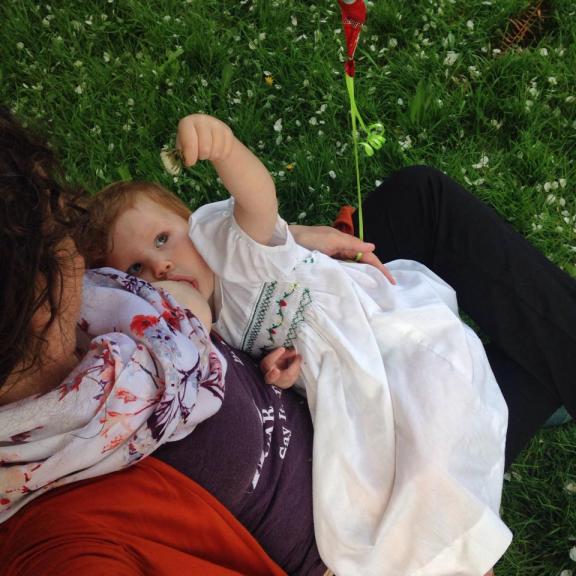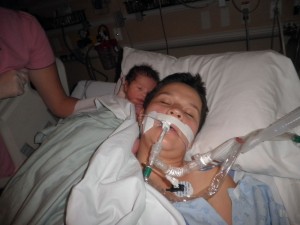by Carmen Castillo-Barrett
I am an immigrant Dominican mother, with African American roots on my father’s side. My husband is of Caribbean decent. We got pregnant with our daughter in 2006. The almost 42-week pregnancy allowed my husband and I time to explore and talk to each other about parenting. We decided we were going to do things differently than how the rest of our family did them simply because it’s what works for our family. We expected to be met with lots of questions and lack of understanding as to why we were doing things differently, but I was certainly not prepared for the ongoing negativity that was associated with our decision for me to breastfeed. I am not the only one who shares this experience. Below are just some of the reactions I got and reasons why Black Breastfeeding Week is important.
1- “You’re going to kill your baby”
At four weeks postpartum, my mother-in-law began to express concern over the fact that all my newborn had to eat was breast milk. I’d done enough research while pregnant to know that breast milk is all an infant needs, but the research never heeded any warning about being confronted with the accusation that I was going to kill my baby by exclusively breastfeeding. My mother-in-law’s concern was real to her because she didn’t know any better. She called relentlessly, offering bad advice that wasn’t solicited, all while expressing concern that there was no way my daughter has getting the nourishment she needed. This was the most significant obstacle I’ve faced as a nursing mother and it ultimately undermined my confidence and affected my decision to discontinue nursing my daughter.
2- “You’re still breastfeeding?!?”
This question started popping up around the time both kids turned 6 weeks old. Both sides of our family saw no need to continue nursing past six weeks of age and thought that the natural progression of things was to introduce formula. My mother had no experience nursing a baby past trying it out for a couple of weeks with me, so her contribution to my growth as a breastfeeding mother was to state that the baby was now “old enough for formula” and I was now “finally free” to stop breastfeeding. There was no real reason why everyone thought I should wean, it was simply a matter of never having seen a non-white mother nursing past the immediate infancy phase.
3- “What? You can’t afford formula?”
When my daughter was two months old, we went out to lunch with my husband’s cousin and his wife, whom had two children of their own. While at the restaurant, my daughter needed to eat, so I discreetly breastfed her at the table. No one at the table batted an eye, but just as I was feeling confident that my nursing in public wasn’t a big deal, I was met with the question of “Why are you still breastfeeding? You guys can’t afford formula?”. I was so mad! Worse still is that when I called my mom about it, she felt the comment was perfectly justified and offered to send me money for formula. Somehow, my breastfeeding was seen as a reflection of our economic status rather than a conscious decision on how to feed our baby.
4- “You’re just trying to be white.”
A common way to dismiss a non-white mother’s parenting choices is to wave them off as her “trying to be white”. This comment is applied to much more than breastfeeding. If you are a non-white mom who co-sleeps, uses cloth diapers, has a home birth, employs a doula, teaches your baby to sign, or does anything outside of the “normal” things a non-white mom is “supposed” to do, then your parenting choices aren’t seen as something that simply works for your family, but a desire to leave behind your true roots to pursue one’s desire to emulate a white mother. This label is applied to non-white women of all shades as a means to shame, ignore, undermine, second guess, disrespect, and pigeonhole our choices to parent as best as we can.
5- “Your baby has teeth, that means it’s time to wean.”
By the time my daughter got her first tooth at 9 months, I was no longer nursing. My son, on the other hand, started getting teeth really early at barely four months old. I made the unfortunate mistake of posting a picture of him grinning with his new itty bitty baby teeth on Facebook. The immediate and overwhelming response from both sides of the family (and some friends) was that it was time to wean because “obviously” his incoming teeth meant it was time for “real food”. Up to this day I’m still unsure what “real food” I was supposed to feed a baby that young.
6- “You’re going to turn him gay.”
While it’s a scandalous thing to say to anyone, this last comment is particularly held as true among Caribbean families. Due to bigotry embraced by both older and younger generations and stubborn cultural superstitions, many Caribbean families believe that one can be “turned” gay and that nursing one’s son past a certain acceptable age will contribute to their sexual orientation. The lack of support and obstacles I faced when nursing my daughter were nothing compared to the outright hatred that the possibility of me nursing my son into a batty boy brought out in members of our family. This is why, after 7 months of exclusively nursing my son, I started pretending that I had weaned him. Only my husband and close friends knew that I was still breastfeeding.
Imagine if your entire breastfeeding experience was framed by the comments I listed above. How successful do you think you could be? This is why Black Breastfeeding Week is so important.
Carmen Castillo-Barrett is a wife and mom who resides in Brooklyn, NY. She is the Executive Director of the non-profit organization, Kiddie Science.






 This is exactly what the World Alliance for Breastfeeding Action had hoped for when they launched World Breastfeeding Week in 1992. Each year, World Breastfeeding Week celebrates women’s breastfeeding rights from August 1-7. The global campaign aims to protect, promote, and support breastfeeding, while raising public awareness about the benefits of breastfeeding.
This is exactly what the World Alliance for Breastfeeding Action had hoped for when they launched World Breastfeeding Week in 1992. Each year, World Breastfeeding Week celebrates women’s breastfeeding rights from August 1-7. The global campaign aims to protect, promote, and support breastfeeding, while raising public awareness about the benefits of breastfeeding. 


















